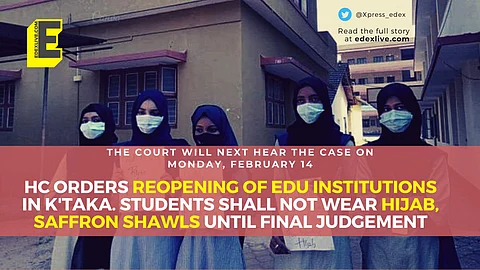

"We pass the order that educational institutions shall start. But as long as the matter is pending and under consideration by the court, the students and stakeholders shall not insist on wearing any religious garment, including headscarves or saffron shawls," said Chief Justice of Karnataka's High Court, Ritu Raj Awasthi, passing an interim order in the case of petitions filed by Muslim women against their college's ban on the hijab.
The Karnataka High Court bench, which also consisted of Justice Krishna S Dixit and Justice JM Khazi, said that their primary interest is that peace and tranquility should prevail in the state, and that the advocates representing the petitioners should not insist on allowing students to wear religious apparel until the matter is disposed of.
Senior Advocates Sanjay Hegde and Devdutt Kamat, representing the petitioners, raised objections to the interim order. Hegde said, "For a few days faith cannot be suspended," when the Chief Justice said that it is a matter of "a few days." Kamat added, "But that would amount to suspension of Article 25. We are being asked to choose between religious conscience and education."
The next date of the hearing is on Monday, February 14, at 2.30 pm.
The order for reopening the educational institutions immediately was given as high schools and colleges were ordered shut by the Government of Karnataka after the hijab controversy took an ugly turn in on Monday, February 7, with reports of violence emerging from colleges in various parts of the state, including Bagalkot and Shivamogga districts where a teacher and a student were attacked, respectively. Following these reports, Karnataka's Chief Minister, Basavaraj Bommai, called for peace and declared a three-day holiday for all high schools and colleges in the state from Tuesday, February 8.
The petition claimed that by denying entry into educational institutions for wearing the hijab, the institutions are violating their fundamental rights under Articles 14, 19(1)(a), 21, 25 and 29.
